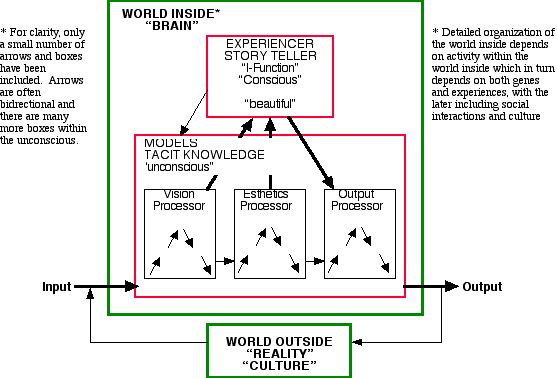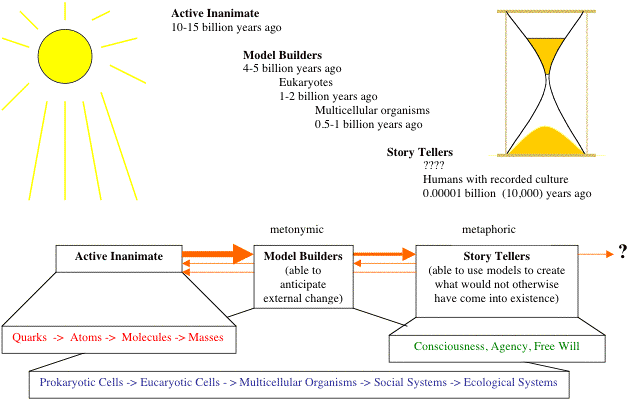"A foolish consistency is the hobgoblin ..."
(Ralph Waldo Emerson, Self-Reliance, 1841)
Could one relax the demand for consistency? Is it useful? Would it yield greater completeness?
"To be, or not to be: that is the question"
Shakespeare, Hamlet
 Another Trick: Take a fresh look at what evolution has created as an effective inquirer into/explorer of "reality" ....
Another Trick: Take a fresh look at what evolution has created as an effective inquirer into/explorer of "reality" ....
- Irreversibility already established (eg lateral inhibition network) (reservation: local vs global irreversibility)
- Inconsistency already established, is in fact a "neural uncertainty principle", comparable to the uncertainty inherent in quantum mechanics? and with same implications re reversibility? advantages re "computing"?
- Indeterminacy .... likely (VERY likely)
- Improved "completeness"?
- Roger Penrose, The Emperor's New Mind, 1990
- Four color problem
- "provable"? no ... "likely"? yep (product of Chaitin's "experimental math")
Self-referentiality, recursion (more on the brain trick)
"To be, or not to be: that is the question"
Shakespeare, Hamlet
- Roger Penrose, The Emperor's New Mind, 1990
- Four color problem
- "provable"? no ... "likely"? yep (product of Chaitin's "experimental math")

- Human brain is both iterative and recursive/self-referential (others?)
- Iteration (Wolfram) - deterministic but not compressible (Chaitin)
- Iteration plus - indeterminate and not compressible
- Iteration plus model model-building
- Iteration plus etc. and recursion/self-referentiality?
- Has both multiple "model building" and compressive/self-reflective ("story telling") capabilities
- Has distinctive "agency" capabilites vis a vis outside world: to conceive/bring into existence what would not result from "model building" (iterative change) - "free will"
- Has distinctive "agency" capabilities vis a vis itself: to conceive/bring into existence what would not result from "model building"
"I am, and I can think, therefore I can change who I am"
How to proceed in face of "profound skepticism"?, ie with no fixed starting point that one can treat as unquestionable ...

- The universe happily iterated/evolved without formal axiomatic systems (recursion/self-referentiality?) for billions of years
- Humans have the capability to do so without formal axiomatic systems ("treeness")
- Humans also have the capacity to conceive/make use of AND modify formal axiomatic systems
- The combination gives us unusual capabilities IF we make use of both
- Whether "reality" a formal axiomatic system or not, create/use/modify formal axiomatic systems, but don't "believe" in them.
BAYESIAN STATISTICS
AN UPDATED THEORY OF INFORMATION?
Home
| Calendar | About
| Getting Involved
| Groups | Initiatives | Bryn Mawr Home | Serendip Home
Director: Liz McCormack -
emccorma@brynmawr.edu
| Faculty Steering Committee
| Secretary: Lisa Kolonay
© 1994-
, by Center for Science in Society, Bryn Mawr College and Serendip
Last Modified:
Wednesday, 02-May-2018 10:51:19 CDT